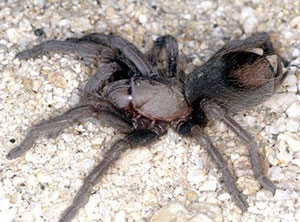Are tarantulas dangerous?
 Tarantulas have become increasingly popular pets within both the kid and adult worlds. Known for their massive size, hairy body and frequent cameos in horror movies everywhere, these creatures are actually much less menacing than they look.
Tarantulas have become increasingly popular pets within both the kid and adult worlds. Known for their massive size, hairy body and frequent cameos in horror movies everywhere, these creatures are actually much less menacing than they look.
Tarantulas are arachnids, which is a class of animals with eight legs and an external skeleton (also known as an exoskeleton). This is important to help distinguish spiders from other insects, which only have six legs. Within the class of arachnids there are many families of spiders; the large and hairy tarantulas we know come from the Theraphosidae family, which includes over 900 other specific species. They can range in size from as small as 2.5 cm (about the length of a fingernail) to as big as a foot-long sandwich!
The tarantulas’ name comes from an Italian town of Taranto where a different spider was initially found but the name traveled to North America and stuck like a fly in a web. Tarantulas can be found throughout the Americas, Africa and in parts of Asia. Overall, they prefer dry soils in deserts and grassland areas. In North America, many species prefer living in the ground, but rarely they can be found residing within trees.
Tarantulas mainly eat insects and other smaller spiders, but large tarantulas can kill lizards, mice, birds and even snakes! Before attacking their enemy or prey, tarantulas usually send a warning signal either by getting into a “threat posture” or making a hissing sound. The tarantula’s mouthparts, called chelicerae, contain the glands that produce the venom that drain through the fangs – like nature’s version of a hypodermic needle. Once prey has been envenomated, tarantulas secrete juices from their chelicerae that coat their captured prey and help to liquefy and digest it from the “outside-in” (the reverse of how our own stomachs work!) making it easier for the tarantulas to slurp up.
As horrifying as that sounds, most tarantulas are relatively harmless to humans. Only rarely does a tarantula bite cause serious harm or an allergic reaction that may actually become life-threatening to some.
Tarantulas do have another potentially more serious defensive trick up their sleeve – their hair! Other than giving tarantulas an instantaneously recognizable outfit, these hairs serve a secondary function of defense. Many of the North and South American tarantulas have barbed wire-like, 1-mm long hairs on their belly which, when attacked or threatened, tarantulas can fling at their attackers. These hairs may be extremely irritating to human eyes and mucous membranes (our nose and mouth) and can lead to intense itching and the formation of hives (urticaria). Because of this, any airborne fragments of a tarantula can lead to severe irritation and allergic reactions, some even requiring emergency medical treatment.
Wait aren’t tarantulas danger’s to humans
I had a tarantula fall on me without really noticing it from a tree while I was riding my motorcycle. After I reached the stop sign, he bit me. My whole nervous system got a terrible shock — it felt totally different from a bee sting, and it hurt much worse. I had no idea at the time what had happened. I drove a bit more and it bit me again. That one hurt too, but it hurt slightly less. Then I went feeling for something and it bit me 7 more times, but those bites did not really hurt. Later I had a pit in my skin where the worst bit was. He got some meat with the first one. I was checked for an infection, and I did have one. I took 3 days of antibiotics.
the reason the first one hurt more may be because the rest were “dry bites” meaning it didn’t inject venom.
A Spiders are dangers
i have a tarantula
tarantula are the cutest animals in the world
I think this info was very usefull!!
I’m having a panic attack
That’s really cool. I’ve heard some people say that they are deadly, but others say that they are harmless. So I was a bit confused, and this was really informative.
but do they some kill people that they have a bite
This is great information! We just had a large tarantula very near our house today. My brothers killed it, thinking it was extremely poisonous. They did not want any one in our large family getting hurt. Now we know to be careful and just let them live. Again, thank you so much for this helpful information!
I live in a apartment and I have been seeing tarantulas in my bedroom on my bed. I don’t know how or where they have come from. MY room has been sprayed but it hasn’t been a help. Any suggestions? I haven’t been able to sleep in my room for fear be of one getting on now me and maybe bitting me.